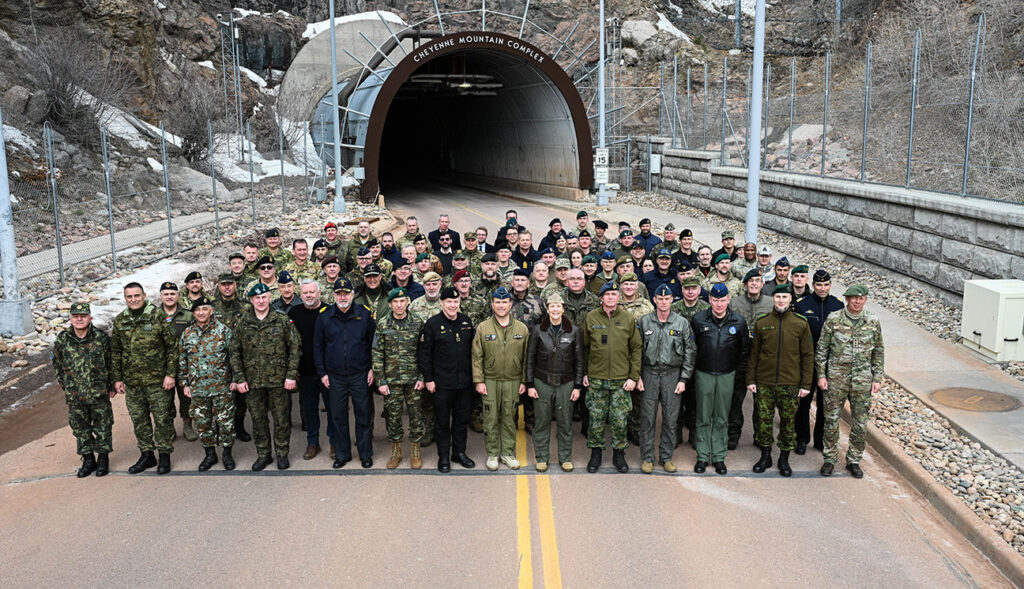Italian Adm. Giuseppe Cavo Dragone led a NATO military delegation to Colorado in March 2025 to learn about the operations of U.S. Space Command, U.S. Northern Command, North American Aerospace Defense Command and other U.S. military installations. U.S. SPACE COMMAND
THE WATCH STAFF
A large delegation of NATO representatives, headed by an Italian admiral, spent three days touring U.S. Space Command (USSPACECOM), the joint headquarters of U.S. Northern Command (USNORTHCOM) and North American Aerospace Defense Command (NORAD), and other military installations in Colorado in March 2025. The tour enhanced the trans-Atlantic relationship of the alliance and shared the scope of the U.S. operational capabilities in space and homeland defense.
While in Colorado, the NATO Military Committee received briefings from top officials at USSPACECOM and NORAD. At USSPACECOM’s headquarters at Peterson Space Force Base in Colorado Springs, Gen. Stephen Whiting, USSPACECOM commander, and Royal Air Force Air Commodore Darren Whiteley, USSPACECOM’s strategy, policy and plans deputy director, gave presentations about the operational threats facing the commands and explaining their respective missions. Later, while visiting NORAD, Royal Canadian Air Force Lt. Gen. Blaise Frawley, NORAD’s deputy commander, met with the group to provide information about the joint Canadian-U.S. command’s missile defense capabilities.
Italian Adm. Giuseppe Cavo Dragone underscored the importance of the visit for NATO in a social media post. “We discussed their vital and strategic role, for the whole Alliance, in protecting North America from aerospace and maritime threats. Grateful to Gen. Whiting and [Lt. Gen.] Frawley for valuable insights, and to [Maj. Gen. Thomas] Sherman [U.S. Air Force Academy] for a deep dive into space warfighter education,” Dragone posted on X.
U.S. officials appreciated the opportunity to share best practices with allies. “The current strategic environment requires international cooperation in space. Like Gen. Whiting often says, ‘space is a team sport.’ Having representatives from the NATO Military Committee here at USSPACECOM and in Colorado Springs this week, emphasizes NATO’s commitment to upholding their responsibilities to readiness, deterrence, and warfighter effectiveness across the Alliance,” said Maj. Gen. Brian Gibson, USSPACECOM strategy, plans and policy director, according to a USSPACECOM news release.
NATO Military Committee representatives came away impressed with what they had seen, which included tours at the Cheyenne Mountain Complex, U.S. Air Force Academy, Fort Carson, and the Catalyst Campus, which promotes innovation, provides training and collaboration with commercial partners to advance national security, according to the release. The 1st Space Brigade, U.S. Army Space and Missile Defense Command and the 4th Infantry Division conducted a multidomain operation demonstration, showcasing “the agility, coordination, and technological superiority necessary for NATO to maintain operational advantage,” according to a NATO news release. The knowledge from the demonstration will inform the alliance’s future multidomain operation approach moving forward, the release stated. “It’s been a real eye-opening experience for all of us, and we’re going to go back to NATO headquarters in Brussels with a deeper understanding of the space domain and how to do multidomain operations,” said Royal Canadian Navy Vice Adm. Scott Bishop, Canada’s representative on the military committee.
Earlier in their trip to the U.S., the delegation visited NATO commands in the U.S., including Allied Command Transformation and Allied Joint Force Command Norfolk. The discussions in Virginia focused on security challenges, increasing force capability and enhancing transatlantic cooperation, according to the NATO release.
Several committee members said a highlight of the trip was learning firsthand about the rapidly developing capability of USSPACECOM. “As the U.S. continues to support its European Allies, USSPACECOM is dedicated to ensuring it remains focused on U.S. security threats and operating with Allies and partners as a team committed to collective defense capabilities,” the USSPACECOM release stated.

